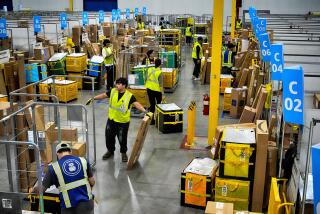Japan Economy Grows at 15-Year Record Pace
- Share via
TOKYO — Japan’s economy grew at its fastest pace in 15 years in 1988, officials said today, even though consumers cut back on spending in the closing months out of respect for the dying Emperor Hirohito,
Growth accelerated to 5.7% last year, up from 4.5% in 1987, as strong domestic demand propelled the economy forward.
“1988 was a good year,” said Takao Akabane, vice minister for economic planning. “And it was achieved because of domestic demand-led growth.”
Good News for Trading Partners
That is good news for Japan’s trading partners, who have been pressing it to shift the emphasis of its economic growth away from exports toward domestic demand.
Both consumers and companies were big spenders last year. Consumers snapped up cars, electronic goods and expensive appliances while companies stepped up spending on factories and equipment.
The performance was the more impressive because it occurred despite a marked slowdown in growth in the final three months.
The economy rose at an annualized pace of 3% in the final quarter of 1988 after roaring ahead at a 9.5% rate in the previous three months.
Japanese officials said consumers appeared reluctant to spend a lot of money on goods and lavish parties in the closing months of 1988 while Emperor Hirohito was on his deathbed. Hirohito, 87, died on Jan. 7 after a lengthy illness.
“Outside of Tokyo, there was quite a slowdown in car sales in October and November,” said Kenneth Courtis, economist at broker DB Capital Markets. “People felt they shouldn’t splash money out on fancy new cars while the emperor was still sick.”
December is a big month for lavish corporate parties in Japan to celebrate the end of the year. But many companies scaled back their celebrations last year out of respect for Hirohito, economists said.
Unusually warm weather also dampened sales of winter clothing in the final quarter.
Although the cutback in spending in the closing months of 1988 was greater than many economists expected, few evinced much concern about the underlying health of the economy.
More to Read
Sign up for Essential California
The most important California stories and recommendations in your inbox every morning.
You may occasionally receive promotional content from the Los Angeles Times.












